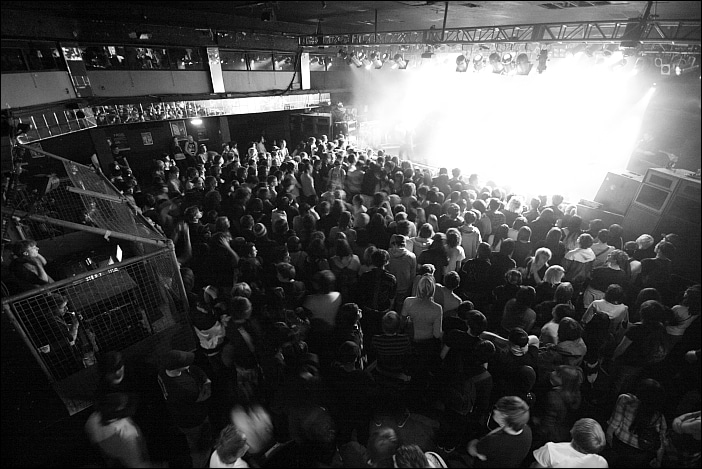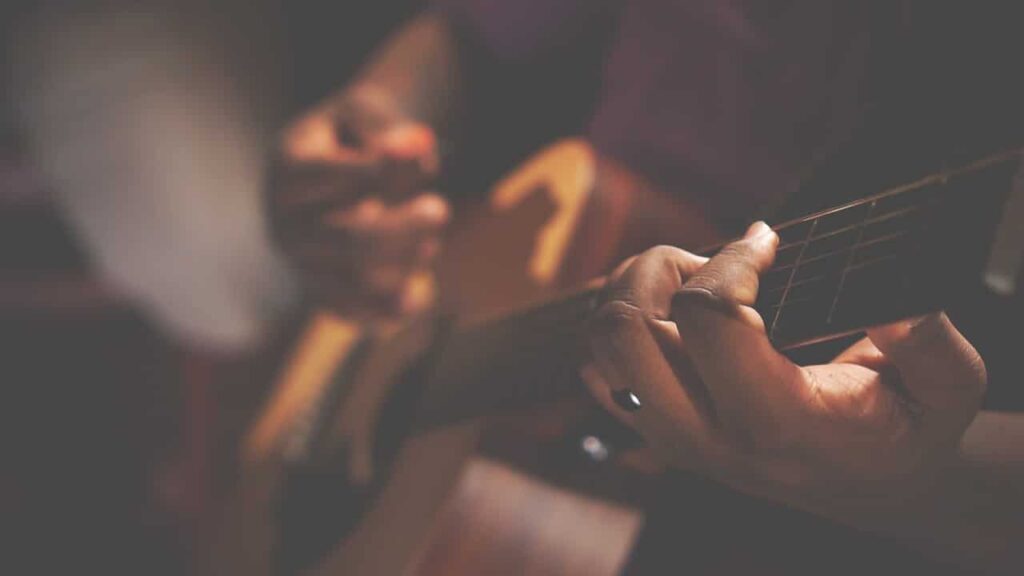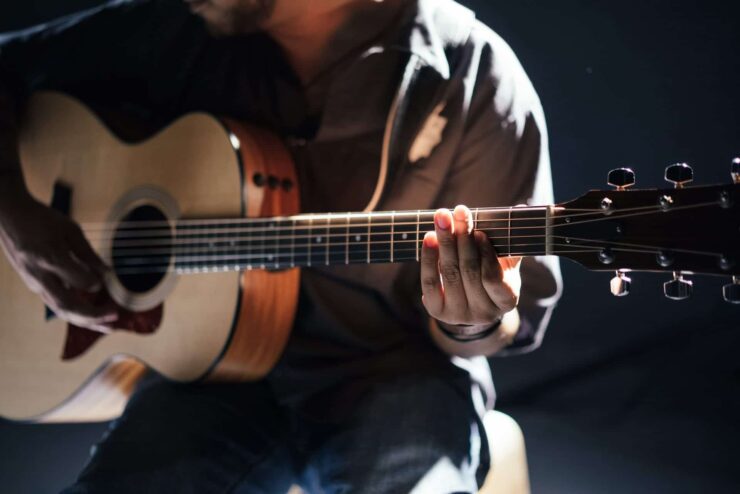Becoming a professional musician is a long and arduous journey. Unlike many other careers, there is no set route to success and no predefined structure to climb. As such, many musicians (at least initially) end up investing a lot of time, money and may even end up working for free.
However, this can be a controversial subject. Many seasoned professionals see musicians working for free as undermining their ability to earn a living, and justifiably so.

That said, it’s not just those just starting out in music. In 2014, Bruno Mars and the Red Hot Chilli Peppers performed during half time at the Superbowl XLVIII.
The biggest and most expensive event in the USA sports calendar – adverts during the Super Bowl cost up to and above $4 million – yet both Bruno Mars and RCHP performed entirely for free. Only their expenses were covered.
Bruno Mars told Forbes magazine,
It’s the biggest stage ever. It’s not something you’re gonna say no to.
Watched by an audience of 96.9 million, it’s fair to say that the potential reach the Super Bowl offers makes it a gig few are likely to refuse.
However, considering that even the NFL refuses to pay performing artists, what example does this set to other performing musicians and promoters that book and organise live music?
When might a musician be asked to play for free?
For those of us not about to play the Super Bowl, but that still rely on music for our income, there are still far too many requests to have you perform for free.
Many amateur (and sometimes professional!) musicians are often enticed into performing on the promise of “exposure”.
Particularly prevalent in the world of original music, It is not unheard of for a promoter to suggest that a band will benefit from a free performance, either by selling merchandise, gaining new fans or by obtaining a paid gig off the back of the freebie.

Very often they arrive at these gigs to find no one in attendance or (arguably worse) crowds of people clutching tickets they spent good money on, but the band will never see a cut of.
Far too many live events companies also now offer various “Pay to play” scams and seemingly high profile support slots, that often turn out to be much less than desired.
For bands that play covers, charity event organisers will often get in touch seeking a free performance, in order to keep the overheads of their event low. While these requests are not usually ill-intentioned, it can still put you in a very awkward position.
Both types of act also suffer from a small minority’s failure to recognise music as a profession. Sometimes it may simply come down to the fact that a few people are genuinely ignorant to the idea that performing music can be a job and not just a hobby. You might be amazed at some of the comments you can get!
When might it be justified for a musician to play for free?
Put simply – hardly ever.
Our Director of Music (now heavily involved with the MU) wrote this piece for the MU’s magazine:

Charity shows can be incredibly rewarding, both professionally and personally. Knowing you have helped to raise money for a great cause is always a good thing, and there is always the potential of finding other clients that will book you for other shows.
That said, you still deserve to be compensated for the time and energy invested into your performance, as well as the years of training and (quite often) thousands of pounds worth of equipment needed to make it happen. If it is a charity close to your heart, you can always choose to donate some of or all of your fee back to them, but you should have your expenses covered at the very least.
When it comes to the question of charity performances, here is the message Sarah-Jane sends to all charity enquiries:
I am afraid to say that we can’t perform for no pay – the Musicians Union don’t allow us to perform for free under the “Work Not Play” rules that we sign up to as members. For more info, see: www.worknotplay.co.uk.
We are finding more and more charities asking us to perform for free and I always say that it’s best to contact local businesses for sponsorship for the music and entertainment as it’s really important for future events and for the success of the evening that you have really excellent music.
I know this from experience of being a volunteer fundraiser myself for three charities who always pay their musicians and we sell lots of tickets because people know they will have a great night out.
Here at Last Minute Musicians I get so many phone calls from charities two days before an event when the musicians they booked (not through us) have pulled out on them to take paid work.
It’s heartbreaking to hear and so I would urge you to incorporate the music into the cost of the ticket so that your musicians don’t feel they are being paid less than their fees and let you down. They can always donate the fee back to you if it’s a cause close to their hearts.
I hope that helps – I am here for a chat if you would like some ideas – always happy to help!
While it is not easy for younger or less experienced Musicians to get the experience in performing that you’ll need to command your fee, it is possible to do it in the right way. Open mic nights offer the opportunity to get yourself out in front of an audience and you can always ask your friend’s bands to help them out on the road or play a guest slot with them at a gig. Many will welcome the help, and you’ll gain valuable insight.
There are also many opportunities to volunteer at festivals around the UK in return for weekend tickets, offering another perspective on what it takes to put on a great show from backstage.
From schools through to university courses, it is also becoming more commonplace for young musicians to be able to study their craft academically.

The only time when you may feel comfortable working for free is when doing a favour for a fellow professional. The music industry sometimes thrives off of such things, and having important people recognise your work ethic and owe you a favour in return can be invaluable. That said, it is still very, very important not to be taken advantage of!
Have your say
Please take part in our poll below:

Howard Nash of Live Lounge Music believes musicians always have a right to be paid for their craft. He does however suggest that there are occasions where it is in the artist’s interest to play for free.
Opportunities should be judged on their merits and it is possible to reap considerable benefits.
Howard Nash
Guildford’s successful alternative music venue The Boileroom welcomes hundreds of local bands and national touring artists every year. Whilst doing their own in-house promotion, all artists are essentially offered the same deal to perform, explains Duncan, The Boileroom promotions assistant …
We pay bands depending on who comes through the door. We ask each person who they’re here to see and we make a tally. At the end of the night, each band gets £1 per person they pulled to the show. The local bands who perform at the Boileroom are happy with this deal and it has always tended to work for us. We did have a Johnny Cash Tribute Band who charged a flat rate fee for New Years Eve 2014″
Duncan, The Boileroom
Many musicians who feel that they are taken for granted often suggest that if it’s worth having live music, it’s worth paying for it.
However, even though many years are spent developing and honing their craft, some amateur and professional musicians continue to perform without a professional fee. Some that argue that this thereby devalues professional musicianship.
Caroline who performs with the British Philharmonic Orchestra suggests,
Musicians should always be paid their professional fee, without exceptions. If this doesn’t happen then there will be no paid work. I got caught out on the free thing a few times back in the day and it has never been of any benefit. In fact, I’ve always come out annoyed and badly treated.
Caroline
Rikki Ancell, a singer at Hong Kong’s Hard Rock Café believes that the issue resides in a lack of understanding and naivety from those that do not play music.
When I talk to venue organisers, I have to explain how insulting it can be to a musician [to not be paid]. I believe that sometimes it’s just a lack of understanding, which is why they believe it’s okay only to pay travel costs etc.
Rikki Ancell
Do you think that playing for free can be beneficial to musicians? Feel free to debate the issue in the comments below…
Sources:
- http://www.worknotplay.co.uk/
- http://www.worknotplay.co.uk/as-a-professional-musician-im-gutted/
- http://www.npr.org/2014/02/03/271128034/the-fringe-benefits-to-bruno-mars-free-super-bowl-gig
- http://jeaniebarton.com/an-olympic-insult-to-musicians/
Share this:



















